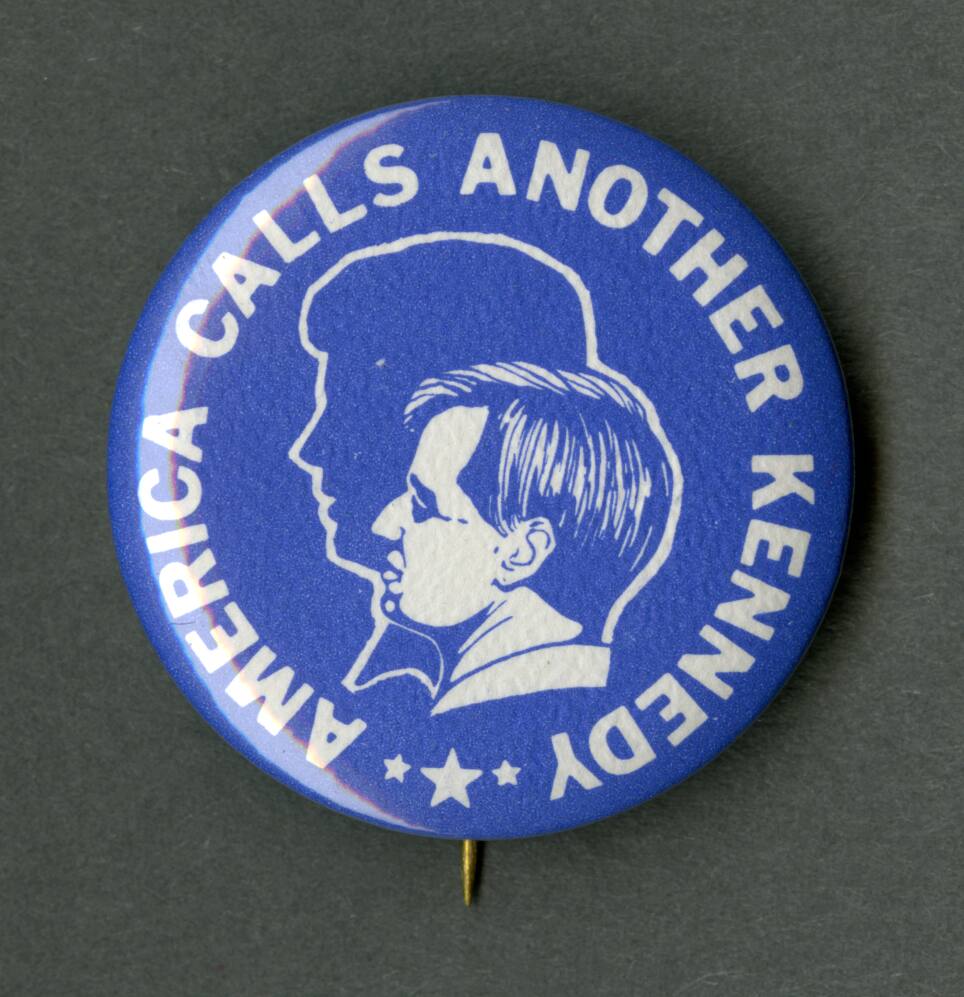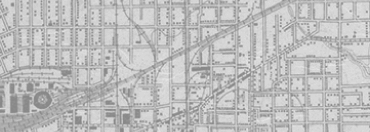


Back
1968 campaign pin for Robert Kennedy "America Calls Another Kennedy"
One metal campaign pin supporting Senator Robert F. Kennedy during his presidential campaign in 1968.The pin has a detailed portrait in profile of Robert Kennedy on a blue background, floating in front of a profile outline of his slain brother, former president John F. Kennedy. The slogan "America Calls Another Kennedy" circles the two profiles.A union logo is printed at the bottom edge at the center. The pin has a metal backing with a brass-colored straight pin.
1968 campaign pin for Robert Kennedy "America Calls Another Kennedy"
1967 - 1968
Metal
Diameter: 1 1/4 in. (3.2 cm)
The Sixth Floor Museum at Dealey Plaza Collection
2016.028.0001
President Lyndon Johnson recognized the power of the Kennedy legacy in the immediate aftermath of the assassination, and he used it to great political effect during the 1964 election. Virtually every Democratic presidential candidate since that time has included the image or the words of John F. Kennedy in their campaign materials, holding up the late president as a shining example of party leadership -- and also tapping into the unfulfilled hope and promise that Kennedy represents. Some candidates, including Bill Clinton and Barack Obama, have been specifically compared to John F. Kennedy in terms of their optimism and soaring rhetoric. - Stephen Fagin, Curator
On March 16, 1968, in the Caucus Room of the Old Senate Office Building (where his brother had announced the beginning of his presidential campaign in 1960), Senator Robert F. Kennedy announced that he was running for the Democratic nomination for president. His candidacy was unusual in several ways, not least being that his announcement put him in direct competition with a sitting president from the Democratic party, Lyndon B. Johnson. (Two weeks after RFK joined the race, Johnson announced he would not run; Kennedy still had to run against Eugene McCarthy and Vice President Hubert Humphrey.)Senator Kennedy's campaign was brief but frenetic - he won four primaries (Indiana, Nebraska, South Dakota and California) in less than 8 weeks. His campaign was cut short on June 5, 1968, when he was shot at close range at the Ambassador Hotel in Los Angeles, California, hours after he had won the California primary. Senator Kennedy died June 6, 1968. - Lindsey Richardson, Curator of Collections

1968 campaign pin for Robert Kennedy "America Calls Another Kennedy"
One metal campaign pin supporting Senator Robert F. Kennedy during his presidential campaign in 1968.The pin has a detailed portrait in profile of Robert Kennedy on a blue background, floating in front of a profile outline of his slain brother, former president John F. Kennedy. The slogan "America Calls Another Kennedy" circles the two profiles.A union logo is printed at the bottom edge at the center. The pin has a metal backing with a brass-colored straight pin.
1968 campaign pin for Robert Kennedy "America Calls Another Kennedy"
1967 - 1968
Presidential campaign
Legacy
1968 presidential election
Kennedy, John F.
Kennedy, Robert F.
Metal
Diameter: 1 1/4 in. (3.2 cm)
The Sixth Floor Museum at Dealey Plaza Collection
2016.028.0001
President Lyndon Johnson recognized the power of the Kennedy legacy in the immediate aftermath of the assassination, and he used it to great political effect during the 1964 election. Virtually every Democratic presidential candidate since that time has included the image or the words of John F. Kennedy in their campaign materials, holding up the late president as a shining example of party leadership -- and also tapping into the unfulfilled hope and promise that Kennedy represents. Some candidates, including Bill Clinton and Barack Obama, have been specifically compared to John F. Kennedy in terms of their optimism and soaring rhetoric. - Stephen Fagin, Curator
On March 16, 1968, in the Caucus Room of the Old Senate Office Building (where his brother had announced the beginning of his presidential campaign in 1960), Senator Robert F. Kennedy announced that he was running for the Democratic nomination for president. His candidacy was unusual in several ways, not least being that his announcement put him in direct competition with a sitting president from the Democratic party, Lyndon B. Johnson. (Two weeks after RFK joined the race, Johnson announced he would not run; Kennedy still had to run against Eugene McCarthy and Vice President Hubert Humphrey.)Senator Kennedy's campaign was brief but frenetic - he won four primaries (Indiana, Nebraska, South Dakota and California) in less than 8 weeks. His campaign was cut short on June 5, 1968, when he was shot at close range at the Ambassador Hotel in Los Angeles, California, hours after he had won the California primary. Senator Kennedy died June 6, 1968. - Lindsey Richardson, Curator of Collections









